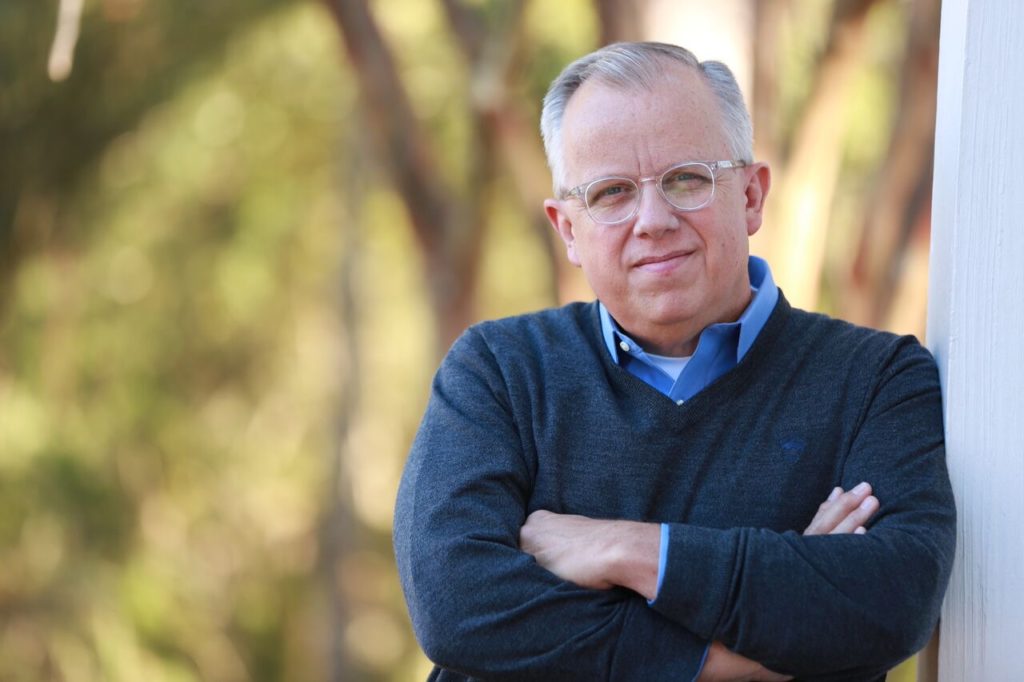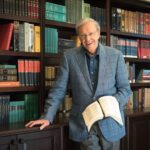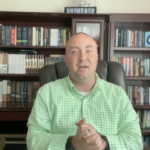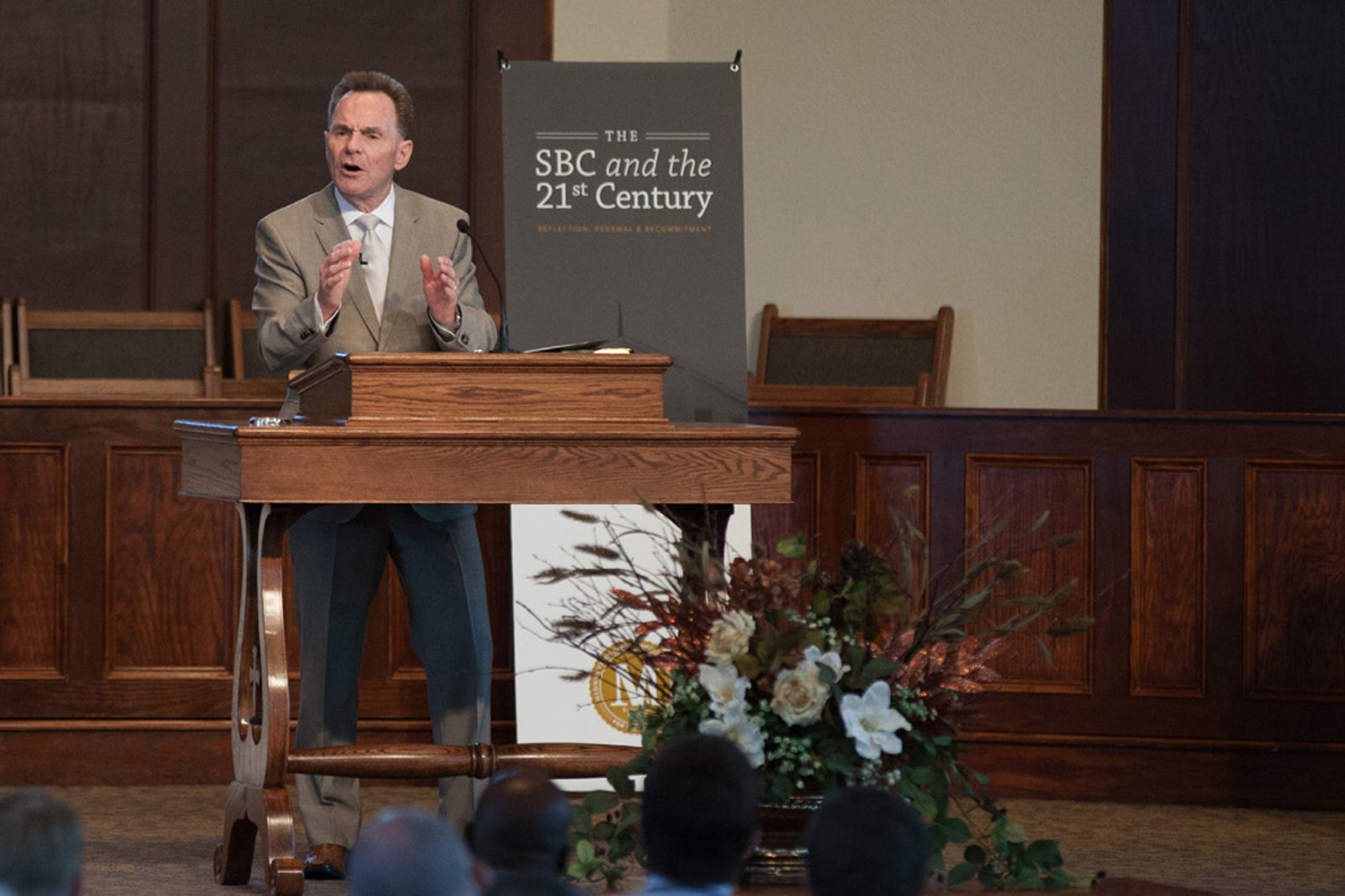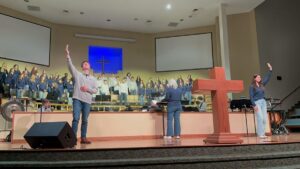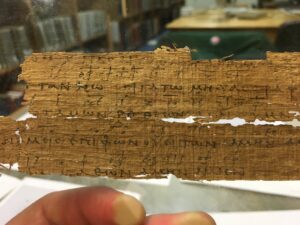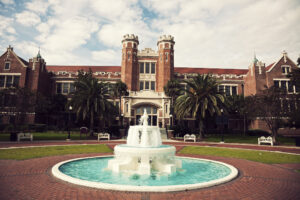
EDITOR’S NOTE: Leading up to the 2021 SBC Annual Meeting, Baptist Press is interviewing candidates who have agreed to accept a nomination to serve as SBC president.
SARALAND, Ala. (BP) – His first time back in the pulpit after the death of his wife Tammy in a car crash, Ed Litton had a message for the congregation.
“The guy that was here before is gone,” he said that Sunday in 2007, “And he’s not coming back.”
Reflecting now, more than 13 years later, Litton knows far better the truth of that statement. Litton, who is in his 27th year as pastor of Redemption Church (formerly First Baptist North Mobile), says his ministry has grown in directions he never would have predicted. His life has, too.
“I don’t know how exactly they all took that,” said Litton of the congregation’s response that first Sunday. “I’m sure it raised a lot of questions in their minds. But they’ve watched God change me.”
Kathy Litton – who lost her husband, fellow SBC pastor Rick Ferguson, in a car accident in 2002 – says the same. Since Ed and Kathy were married in 2009, his friends tell him “lightning struck twice for you.”
“We see each other as God’s grace in our lives, because He has put us on a different trajectory than we would have ever thought,” Ed Litton says. “And we’re on a trip we didn’t want to go on, but it has become the joy of the Lord together, and serving Him. I can’t imagine life without her.”
Litton has agreed to accept a nomination to serve as SBC president at the 2021 SBC Annual Meeting in June. New Orleans pastor Fred Luter plans to nominate Litton, who also served as SBC first vice president in 2001-02. He was nominated for that position by Luter, as well.
Through the years, Ed and Kathy (who is director of planter spouse development for the North American Mission Board) have ministered to many who have lost spouses. And in recent years, Litton’s ministry has included a renewed focus on racial reconciliation.
Litton is a member of “The Pledge Group,” which formed after the riots in Ferguson, Mo. It includes Black and white pastors and civic leaders who hope to help bridge the racial divide in the Mobile area. Last fall, Litton helped write the “Deep South Joint Statement on the Gospel, Racial Reconciliation, and Justice.”
Saying his desire is to help bridge the divide he sees in the SBC, as well, with “unity … in the Gospel,” he sat down recently with Baptist Press.
Baptist Press: What’s the biggest issue facing the SBC?
Litton: I think the biggest issue is unity. Obviously for a convention of churches that has so much variety, our unity is in the Gospel. It’s in the Great Commission. I think one of the things that really has moved me in this direction, to let my name be nominated, is because I see there’s a part of the Great Commission that we seem to have forgotten about. And the way I put it is, the Gospel is the heart of our unity – and the love of Jesus is the heart of the Gospel. The Great Commandment has been, I think, lost to some, or seemingly lost to some. We’ve lost sight of what Jesus told us would drive the Great Commission, and that’s to love one another. Love God first, love each other. By this will they know you’re my disciples.
Baptist Press: How do you achieve that unity? Obviously, the office of SBC president is limited; it’s kind of a bully pulpit.
Litton: I think you have to focus direction, vision for it. I think Southern Baptists at our best are there, at least in principle. One of my favorite statements ever made at a Southern Baptist Convention [annual meeting] that I’ve attended was from Dr. E.V. Hill. He said, ‘I love Southern Baptists for who they think they are.’ And I think aspirationally, we know that that’s what our unity is centered around. Practically, the spirit of the age kind of invades the way we talk to each other, the way we belittle, attack, criticize, rumor, innuendo. That’s a political model and it doesn’t serve the kingdom.
So you’re right, the president is limited in that sense. I think, though, Southern Baptists tend to choose presidents that have those leadership goals and so I would use whatever influence I would have to keep us focused on the authority of Scripture. It’s inerrant, sufficient, and the message of that Scripture has got to get to the nations.
I would have to keep us focused on the authority of Scripture. It’s inerrant, sufficient, and the message of that Scripture has got to get to the nations.
—Ed Litton
Baptist Press: Do you feel like the spirit of the age has been intensified within SBC culture in recent years?
Litton: Oh, yeah. It’s festering. You can’t deny we live in a culture that’s highly politicized, and it just looks like some of the things that are politically acceptable have become acceptable [within SBC culture], and God has called us to rise above that.
Baptist Press: How have you seen that impact the SBC?
Litton: It’s a host of things. Kathy and I are very in tune with church planters. Our church supports nine, soon to be 10 churches in the Send Network and we are heavily involved in Las Vegas. We support five plants there. And so we know that the leadership of the SBC impacts what they’re trying to do, and we need to be very mindful of that. Just like we impact people who are in Gospel-restricted countries around the world. We impact – things that we say, things that we emphasize can either can either advance or harm the Gospel moving forward in those places. I think at our best, we have to keep focused, keep them in our hearts and then on our mind in the things that we do and how we disagree with one another.
Baptist Press: Why Las Vegas?
Litton: We were praying over what city to focus on, instead of just having a focus that just goes everywhere. And it was at a Send conference that Vance [Pitman, senior pastor of Hope Church in Las Vegas] preached. And he and I spent some time together. I just stayed with him. The more I got to know his heart, he sold me. I’d never seen that kind of vision. And I love the West; we both love the West. And so I told him: ‘You had me at come.’ … The ground out West is hard. You have to pound it to get anything to grow in it. But the soil is good for growth. And they’ve been there for 20 years, pounding away at that soil. And Hope is an exciting place. It’s a great church.
We were with Heiden [Ratner, pastor of Walk Church in Las Vegas] last weekend, and to see the church that we’ve been investing into, to see what God’s doing out there is pretty encouraging for us. The whole thing for church planting for us is, I tell guys my age, ‘You need to be involved in mentoring the next generation, because the reverse-mentoring is worth it.’
I tell guys my age, ‘You need to be involved in mentoring the next generation, because the reverse-mentoring is worth it.’
—Ed Litton
Baptist Press: What’s something the SBC is doing that you’re enthused about?
Litton: Our disaster relief is something we should all be proud of. Our international missions, we all are excited or need to be excited and focused on that, reaching the nations. And none of these are without struggles, but I think our church planting efforts are focused in the right direction as far as reaching unreached cities. So I would say those things I’m very excited about. I think investing in the next generation. We need – I know the numbers of young men going into the role of pastor is declining, and we need to address that. I don’t think the seminaries can change that. I think the local church has to address that issue. And we need to invest in young people, call our people out to ministry, call our people out to service for the Lord. And I think out of that, we’ll see more guys wanting to be pastors, answering the call to pastor the local church.
Baptist Press: How do you do that at Redemption Church? What’s that look like?
Litton: That’s a great question. We intentionally, several years ago, acknowledged to our church that we were aging out. And that time I think our average age was 38, so we were younger than most. But we said, ‘We need to intentionally reach the next generation,’ and I asked the older, 50-and-above crowd, to go with me, that we reach them intentionally. That’s been over 10 years ago, 11 years ago now. Our numbers have dropped to 28, I think.
Baptist Press: So in 10 years, you’ve dropped the average age of the church by 10 years?
Litton: They did. They agreed. We had some that said, ‘You don’t want old people.’ That’s not what I said. They found other places. But we intentionally said, ‘You’re the more spiritually mature, let’s do this.’ And they bought it, and they said, ‘Let’s do it.’ I’m very thankful for that. Even when I presented that vision, they said, ‘What’s that mean?’ I said, ‘I don’t know – but you probably aren’t going to like all the music.’ But our music has always been contemporary, so that wasn’t a hill too far for them. We’ve never allowed that to be an issue.
But I think the intentionality of reaching them is what ultimately led to a lot of changes, which led to a name change, a multi-site strategy, a discipleship shift and change in our church. … One of the things is we intentionally hired younger. The University of Mobile provides us a lot of musical talent. It provides us a lot of potential ministerial talent, and so we have several young men who are going through seminary online. The other side is that I have a preaching team of guys that I teach and mentor in preaching. We work on sermons together. We study together. And then they are rotated into preaching with us. And so on both campuses, we have live preaching and we all preach the exact same text.
Baptist Press: How do you address issues within the culture?
Litton: I think I’ve learned that when you see a cultural problem – and we are to speak to cultural problems, but we tend to, we see them at a 35,000-foot level. Which means you don’t see the people on the ground, you just see these big ideas, and you bomb them. But it’s best for a pastor to stay a crop-duster and stay close enough that you can see the faces of people when you address cultural problems. You still speak the truth in love – but it’s the ‘love’ part that’s sometimes missing in our prophetic nature. And pastors have to be prophetic.
Baptist Press: When you talk about seeing not just the problem, but the people – with racial tension now in the SBC, are we seeing things as a problem instead of as people?
Litton: So you’re sitting in your living room watching Fox News – you’re watching whatever, but it’s probably Fox News – and you’re seeing all kinds of burning and strife and police engagement with African Americans, and so it forms an attitude and an opinion. And I’ll be honest with you, I think the biggest obstacle is fear. People are afraid to engage the other, because we are afraid of what we see at a 35,000-foot level. But whenever you engage the other, you begin to realize not just humanity, you begin to realize what we have in common and you begin to love one another.
Whenever you engage the other, you begin to realize not just humanity, you begin to realize what we have in common and you begin to love one another.
—Ed Litton
Part of what we’ve experienced here [is], after Ferguson, a group of pastors, Black and white, and some civic leaders – a retired federal judge, a couple of sitting judges and lawyers and doctors – we just started meeting together every two weeks for lunch. And we hammered out what we’re going to do. At first we were all going to solve the problem, but we got some great counsel from Mission Mississippi, which is a racial reconciliation group in Mississippi. It’s been there for 25 years and it’s a great unsung story. They said, ‘Guys, you’re not going to solve this problem, but you’re going to learn to love one another.’
And so we sat and talked about the most gut-wrenching realities. And there was anger, there was frustration, there was accusation, there were questions. And we’ve stayed at the table and have formed a group [The Pledge Group] that are closer than brothers and sisters. And it has changed my whole perspective on dealing with race. And I’ll be honest with you, I went in very timid. I stayed quiet as long as I could – which is a miracle – because I was afraid of saying the wrong thing. I was afraid of being identified with people who may not have my theology. And so in spite of those fears, I sat at that table. But I’ve learned that you don’t have to see eye to eye – I’m not talking about within our convention, I’m talking about outside – well no, I’m talking about both – you don’t have to see eye to eye. You have to love one another.
And when that becomes the centerpiece – for months we discussed, what’s the core of this problem? And I kept saying, ‘Well it’s a sin problem, and it’s a Gospel solution.’ And that was hotly debated. But by the time this process led us to do other things, we all agreed it was a sin problem and a Gospel solution. No theory ever came up. None of us even knew what that was. All we knew was that it was a sin problem and a Gospel solution. It’s not been perfect and we haven’t changed the world. But we’re making a dent in this city that just wasn’t there.
This city is a great city but the last slave ship to offload in North America was here. The last lynching was here in the 1980s. This city is two parallel universes together that never cross, or seldom cross. And so God is doing something and we’re grateful to be a part of that.
But I think Southern Baptists have untold resources to address this issue. And the resource we have is people and their willingness to love, their willingness to sit down and listen, and not walk to the table saying, ‘I know what you’re about, I can tell what you’re about, and I’m against this and this and this about you.’
The other thing, too, that was stunning to me in its simplicity, was how every human, I don’t care what the skin color is, wants and longs for respect. And we don’t intend to disrespect people but we do, by not listening and not hearing and acknowledging their suffering.
We sponsor an annual event called ‘Shrink the Divide,’ and it’s pretty self-explanatory. We’ve had John Perkins, Russell Moore speak. We’ve had the bishop of Rwanda speak. This year we had three men from the Charleston shooting. Marshall Blalock was one of them, a pastor who lost his wife and a young man, Chris Singleton, who lost his mother in the shooting. It was a powerful, powerful message on forgiveness and the grace of God.
Again, I’m so grateful for everybody in our group because it is Gospel-centered, and it has reminded me that that is the solution. And again, for what ails us as Southern Baptists, that is the solution. Listen, our theology is precious to us. But when it becomes a bat that we beat each other up with, that’s wrong.
Baptist Press: Tell us a little about your path to ministry and how you were called.
Litton: I ran from the call of God in my life at 17. Ran hard. And realized that God had put his hand on me and that I could run but I couldn’t hide. And so I surrendered under the leadership of a cowboy pastor out in Arizona named Ron Hart. Ron mentored be, taught me and after seminary his church sponsored our church plant [Mountain View Baptist] in Tucson.
I tell people – I laugh – NAMB provides so many resources for helping guys, not only vetting those guys but equipping those guys. I got nothing. The guy that enlisted me, I looked at him – I won’t tell you his name; he’s a great guy – but I said, ‘So what do I need to know?’ He said, ‘What do you mean, what do you need to know?’ I said, ‘Well, how do you start a church?’ He goes, ‘You preach Jesus and you lead people to Jesus!’ And I tell people, I say, ‘You know what, I’d like to choke him’ – but I couldn’t. I’d have to kiss him because he was right.
And so it was a lot of trial and error. But man, I’m telling you, God blessed it. It exploded in growth. By the time I left, almost 7 ½ years, almost half the people were brand new believers. They’d never heard the Gospel before. That’s Tucson, that’s Vegas, that’s a lot of places in the West.
So that’s where we started and the Lord brought us here [to Alabama]. You talk about culture shock. I went from a Gospel-starved place to where people were – [Southwestern Baptist Theological Seminary evangelism professor] Roy Fish told me, ‘Everyone in Mobile thinks they’re saved,’ and he said, ‘I wouldn’t leave Tucson for that.’ And Roy Fish was such a huge mentor in so many lives at Southwestern in those days. I called him one time and left a message on his answering machine; when I finished the message I said, ‘amen’ – just to tell you how much I revered Dr. Fish. And so when he told me not to do it I had to really go back to my prayer closet and finally clarified that this is what God wanted me to do.
Baptist Press: It is a different context than Arizona, and many of our – most Southern Baptists, by the numbers, are in the Bible Belt. Coming at ‘cultural Christianity’ from a different place, do you attack it differently?
Litton: Yeah, and guys like Dean Inserra [author of The Unsaved Christian] help us. His work on that and his observations about cultural Christianity. In Tucson, the cultural religion was Catholicism, and it was easy: Share the Gospel with those guys and they’d never heard it. And here, the cultural monster is Baptist. And so it takes a totally different approach to how you share with them. Yes, it’s very different. I think the tone of our ministry has been focused on evangelism, missions and discipleship, and it’s grown through the years.
The tone of our ministry has been focused on evangelism, missions and discipleship…
—Ed Litton
I’m glad we don’t do what we did at the beginning, but the culture has changed. When I came here our church was very aggressive on Monday night outreach. We became aggressive, I should say, on Monday night outreach to the point that people laugh today and say they knew on Monday night to go shopping or do something because North Mobile [Baptist Church] was coming.
And so there are days you’re tempted to think, we’ve got to go back to that – but the culture here has changed. And God is bringing the nations here. And so helping our people see the need for the person behind the burka at Sam’s, to understand that there are Muslims in their neighborhood, to understand that they’re people that we could reach with the Gospel.
Baptist Press: You grew up in Tucson, right?
Litton: I’m originally from east Tennessee. In 1971, we moved to Tucson for my mother’s health. The only job my dad could get was running a motel that had been house of prostitution. This guy got it in a land deal and didn’t know what to do with it and it was a mess. Drug deals going on constantly. So he hired my dad to clean it up. And my dad is a character in and of himself: a 30-year veteran of the Navy, started in World War II, went through Vietnam, was a drunk. A Baptist pastor in Virginia Beach, Va., shared the Gospel with my dad in a grocery store and months later when my dad cratered, we took him to this guy. He’d been drunk for two weeks. And we took him to this guy and this guy led him to Christ, and he stood up sober.
I have a memory. I’m 7 years old. I’m sitting in the back seat on the passenger’s side. I can see my dad clearly in the driver’s seat. He looked at my mom when he got back in the car. Now he’d been drunk for two weeks. He was sober. He looks at her and he said, ‘Sue, something just happened.’ And that burned in my mind.
So as a kid – I tell people, I was just like any other kid, and we’d never gone to church. But I knew there was something to God because of what I saw change in my dad.
My dad died about seven years ago. And the last thing he ever said to me, I was leaving on a trip to go to Idaho and I knew he was going to die soon. He died when I was on the plane. But it was a Sunday and he said, ‘Did anyone get saved today at church?’ He was an amazing soul-winner.
So I grew up in an interesting environment and saw the power of God change people’s lives. He changed mine. And for Kathy and I, the most dramatic, traumatic things, both of us losing our spouses. That really is a life-altering experience.
Baptist Press: How did that change your ministry? You told the congregation you wouldn’t be the same.
Litton: Listen, God doesn’t lead you through anything that doesn’t have purpose. There is no meaninglessness to our suffering. With Job, we have to say, the Lord giveth, the Lord taketh, blessed be the Lord, and if you slay me I will praise you.
I knew I wouldn’t be the same. I don’t know how exactly they all took that. I’m sure it raised a lot of questions in their minds. But they’ve watched God change me. I honestly don’t know.
God doesn’t lead you through anything that doesn’t have purpose.
—Ed Litton
When I first came here, just as a contrast and an illustration, the racial issue in this city was very obvious to me because I was from the outside coming in. And I immediately started speaking to it, because I was young, impetuous, stupid. I thought my preaching could change things. So I thought, ‘Let’s just deal with this, we’re going to deal with this.’ I had no idea what Southern passive aggression was like. And they charmed me, they loved me, but they ignored me on that issue. And I came to a conclusion, and I confessed it to my brothers and my sisters in [The Pledge Group]: I made up my mind I wasn’t going to win on this issue. And I made up my mind that it wasn’t my problem: I didn’t start this problem, I’m not going to solve this problem.
So I’ve lived happily ignorant – meaning I’ve intentionally ignored the problem. But through suffering, I began to see things differently. And the story, the parable Jesus told us about the Good Samaritan is so profound. I think for all of us it’s easy to walk around and look the other way. And whoever that guy is in the ditch – it may be us – but it was clear that Jesus commended the guy that got off his donkey and helped. I don’t know what we can do, but we can do something.
And the church has been supportive of that, and I’m grateful. And it’s been interesting to watch how they’ve changed. One of the men who was on the original pulpit committee called me up one day. He said, ‘Pastor, I’ve been going to Walmart looking for Black people.’ I’m going, ‘OK, what does that mean?’ He said, ‘I just go talk to ‘em.’ And he said, ‘I’m going fishing with one of ‘em this weekend. We’re going fishing out on the causeway together.’
And you’re sitting there thinking, you know what? Nobody is pretending that we’re cool or hip, or nobody’s trying to win anything, a Nobel Peace Prize. They just want to obey God. And they’re hearing the Word and it’s affecting some of them. That to me is encouraging. That’s advancement.
Baptist Press: What uniquely positions you to be SBC president?
Litton: I wasn’t looking for this. I’m old school when it comes to this. Adrian Rogers said, ‘The man doesn’t seek the office, the office seeks the man.’ And some people came to us and said, ‘We want you to pray about this.’ And we took it seriously and prayed about it, and God birthed a vision, both myself and Kathy, that there’s a time and a place for everything.
I don’t have infinite wisdom. I have access to His (wisdom) but not mine. I’m a pastor. I think this role is a unique role for a pastor to lead pastors and churches. I think God has given me gifts of leadership, but I don’t possess everything necessary. But I do believe that God has enabled me to pull people together and to focus on a vision that glorifies the Lord and will make us a better ‘E pluribus unum’ for the Gospel.
I am deeply grieved that people are having to consider leaving our fellowship. Kathy and I both were in Southern Baptist life during the Conservative Resurgence. We believe that the Scripture was worth the battle, and we believe that God, in his grace, gave our convention victory in that. This doesn’t seem like that same battle. I don’t think we’re fighting over whether Scripture is inspired, Scripture is inerrant and sufficient.
Baptist Press: What are we fighting over?
Litton: That’s a good question. I would have no way of knowing what other people’s motives are. In that sense, I can’t answer. But we seem to be off-target. I think we’ve got to come back to the Great Commandment. The heart of our unity is the Gospel, and the love of Jesus is the heart of the Gospel. So we have to ask ourselves: Do we love Him? Do we love each other? Because Jesus said that’s our credentials.
Even in Mobile, we came to the decision that how can we communicate the Gospel to this city if there’s such a division between Black and white churches? Or divisions between Hispanic and white, or Asian and white churches? Why do we have these divisions when we all share the same Savior, the same blood? We have to address that issue in the process.
Baptist Press: What’s the makeup of Redemption Church?
Litton: It’s predominantly white. I really don’t have a percentage of how many African American members we have. It’s growing. I don’t know the exact percentage, but some things take longer. We’re moving in that direction. We have more African Americans in leadership than we’d ever had, in lay leadership. It takes time. And we were kind of slow to it.
Baptist Press: If you could sit down with Southern Baptists, what would you want them to know about Ed Litton?
Litton: Well, first of all, that I love them. They came to get me. It was a Southern Baptist pastor who led my whole family to Christ. So whenever I’m asked, ‘Why are you Southern Baptist?’ Well, first of all, they’re the ones who brought the Gospel to us. And so I kind of felt connected at that point. I love Southern Baptists because of the way they loved us. It felt – in our suffering, we felt tremendous love.
I love Southern Baptists because of the way they loved us.
—Ed Litton
I love Southern Baptists for the Cooperative Program, helping me get through seminary. And I mean, there’s a deep debt of gratitude in my heart. And I think we have potential that’s out of this world to actually take the Gospel to the nations. So that’s what I would say: First of all, thank you, because in spite of my quoting of E.V. Hill, I agree with him about who we want to be, aspirationally. We still have time, until the Lord comes, to live up to that. But we’re a family, and as a family, you’re going to have disagreements. You’re going to have struggles and fights and quarrels. But we can’t stop going to the family reunion and we can’t dismiss each other over politics, we can’t dismiss each other over, stop loving each other, even over things that may be doctrinally precious to us, that may be different from somebody else.
In the essentials we have to see eye to eye and walk hand in hand. But some of us think there are more essentials than there are.
